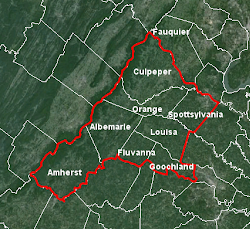Talk about a heavyweight title bout; two future presidents squared off for the same congressional seat, on this day in 1789.
We’ve never had a congressional election that matched-up two historical figures comparable to the first election in Virginia’s 5th Congressional District. On one side was James Madison, the well-known principal author of the Constitution, versus James Monroe, one of the Revolutionary War heroes of the Battle of Monmouth and the Siege of Yorktown.
The Federalists wanted Madison in the first congress. After all, he did write the Constitution, so a position in the US Senate, the upper chamber, would certainly have been appropriate as matter of expertise in the functions of the new government are concerned. But anti-federalists in the state legislature, led by Patrick Henry, voted to keep Madison out and elected William Grayson and Richard Henry Lee as Virginia’s first Senators. That left a run for the House of Representatives, or a position in the inevitable George Washington administration, as Madison’s options.
Most seem to agree today; congress and not the executive branch, was the best place for Madison. But Henry, Monroe, and anti-Federalists did their best to keep Madison out. The new Constitution gave the states the role of drawing their own congressional lines. While some have claimed that the district was drawn specially to disadvantage Madison, Henry biographer John Kukla calls any claims of nefarious line drawing from Henry as “exaggerated.” Kukla explains-
“Unlike the contorted Massachusetts district that unleashed America’s original ‘Gerry-mander’ in 1812, or the outrageous computer-generated precincts of today’s partisan redistricting schemes, all ten of Virginia’s original congressional districts were responsibly contiguous adaptions of the state’s senatorial districts.”1
Below is a picture of Virginia’s original 5th Congressional District. Judge for yourself, but it looks compact to me.

The polls opened on a very cold day. Author Richard Labunski explains the process-
“The voting was supposed to take place only on February 2. Virginia law did not authorize sheriffs -who were in charge of conducting elections and reporting the results- to permit voting on more than one day… But perhaps because of the weather and the difficulty voters had in traveling to their county seats, sheriffs in several counties allowed voting to extend more than one day.”2
The voting period was extended unilaterally? The author so innocently says “perhaps because of the weather,” but any usage of perhaps opens the possibility to seek another perhaps and in this case human nature yells out, perhaps because of voter fraud. This would not fly today; both sides would have their lawyers on site.
When the results were finally tallied, Madison won with 1,308 to 972 (57%- 43%). A solid victory. A great element worth mentioning is that the two were able to maintain their friendship throughout the contest and into their prosperous futures.
Madison campaigned on the promise of proposing a bill of rights as amendments in the first session of Congress. A promise he kept with a list that has endured to this day.
We haven’t seen a congressional race like the first race in VA05 and we probably never will again.
1 Kukla, John, Patrick Henry; Champion of Liberty, 2017, p.352-352
2 Labunski, Richard, James Madison and the Struggle for the Bill of Rights, 2006, p.173